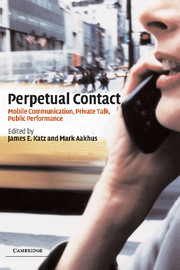Book contents
- Frontmatter
- Contents
- List of figures
- List of tables
- Notes on the contributors
- Preface and acknowledgments
- 1 Introduction: framing the issues
- PART I Mobile communication: national and comparative perspectives
- PART II Private talk: interpersonal relations and micro-behavior
- PART III Public performance: social groups and structures
- Appendixes
- Index
- References
1 - Introduction: framing the issues
Published online by Cambridge University Press: 22 September 2009
- Frontmatter
- Contents
- List of figures
- List of tables
- Notes on the contributors
- Preface and acknowledgments
- 1 Introduction: framing the issues
- PART I Mobile communication: national and comparative perspectives
- PART II Private talk: interpersonal relations and micro-behavior
- PART III Public performance: social groups and structures
- Appendixes
- Index
- References
Summary
Greater than gods
With the invention of the telephone in 1876, it was possible for the first time in history to have real-time conversational interaction at a distance. Back then, the technology was astounding. Early demonstrations of its capability attracted large crowds, most of whom were awe-struck, though some thought it mere legerdemain. By contrast, in the twenty-first century the telephone has for a billion people become, literally, a fixture of everyday life. Only by its absence do we deem it worthy of comment (such as in school classrooms and prisons or in poor countries). The miracle of telephone conversation is too readily forgotten by laypeople and scholars alike. However, the telephone's becoming mobile has re-familiarized many people with the amazement felt by its early witnesses. The exquisite value of the telephone can best be appreciated if one considers the plight of a villager who wants to know if there might be work available in a nearby town, or who needs to summon aid for a sick family member.
Over the years, the telephone has dramatically changed how people live their lives and see their world. Another change of perhaps similar magnitude is in the offing with the mobilization not only of speech but also of a novel array of computer-supported communication and social interaction. Bursty chip-to-chip chats will arrange everything from grocery deliveries to a blind date between two co-located individuals of matching interest profiles. But even today's powers of the mobile phone are extraordinary.
- Type
- Chapter
- Information
- Perpetual ContactMobile Communication, Private Talk, Public Performance, pp. 1 - 14Publisher: Cambridge University PressPrint publication year: 2002
References
- 32
- Cited by

